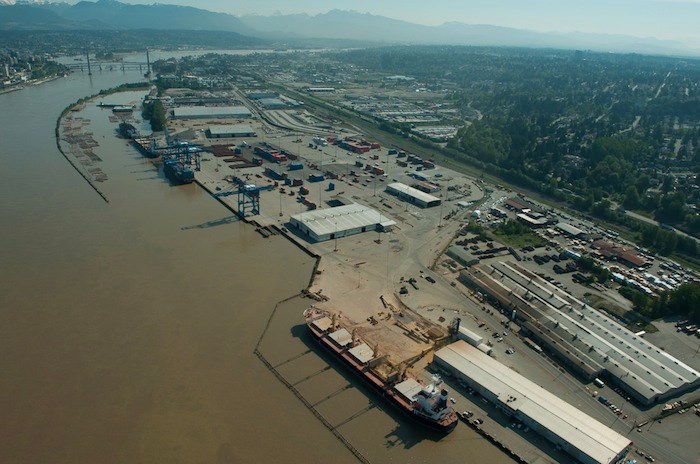A revised proposal to build a new coal export terminal on the Fraser River in Surrey has received approval from Port Metro Vancouver.
The port authority on Monday issued an amended project permit to Fraser Surrey Docks that approves the company's altered plan to load coal directly onto ocean-going ships, rather than first barging coal to a transfer site at Texada Island as originally planned.
The terminal would bring up to four million tonnes per year of U.S. thermal coal by rail through White Rock, South Surrey and Delta, adding one extra coal train per day.
"We're very pleased with the port's decision," said Fraser Surrey Docks CEO Jeff Scott.
Coal opponents predict the project will never be economical, although it has reduced its expected operating costs with the move to loading directly to ships.
Fraser Surrey Docks' project is still facing court challenges and the requirement to get an air emissions permit from Metro Vancouver, after abandoning its court challenge of the regional district's authority.
Scott wants to start construction as quickly as possible, but the target completion date may be fluid.
"It's really about timing our facility to when we think the market is going to swing back in a positive direction," he said.
"We think this is a commodity cycle, a market cycle. We recognize 40 per cent of the world's population still relies on coal to generate electricity and heat and light and the world still needs steel. So we still remain bullish on coal in the long term."
Scott did not directly answer when asked if it was urgent to secure approval lest the new federal government give the port new directions to consider climate change in its reviews.
A new environmental review released by Port Metro Vancouver in support of the decision again concluded the project is unlikely to cause significant adverse environmental impacts.
The shift away from barge loading removed one of the objections of opponents – that coal dust from open barges would be more prone to wafting out into neighbourhoods and the environment.
It also increased the project cost to $42 million because of the need to install a taller ship loader.
An estimated 80 Panamax-size ships would haul coal out each year, instead of 640 barge loads.
Communities and Coal spokesperson Paula Williams said those ships will run on diesel power when moored because Fraser Surrey Docks doesn't have shore electricity available.
"How in the world they expect to obtain an air quality permit for the pollution coming from the coal, as well as the Panamax ships is beyond me," Williams said. "They will have no shore power so those ships will be running 24-7. Luckily, Port Metro Vancouver does not control air quality permits."
One U.S. coal firm recently announced a three-year halt to shipments through B.C. due to "extremely depressed" coal prices.
That means a four million tonne decrease in coal – equivalent to one train per day – coming by rail to Westshore Terminals at Deltaport from 2016-18.



